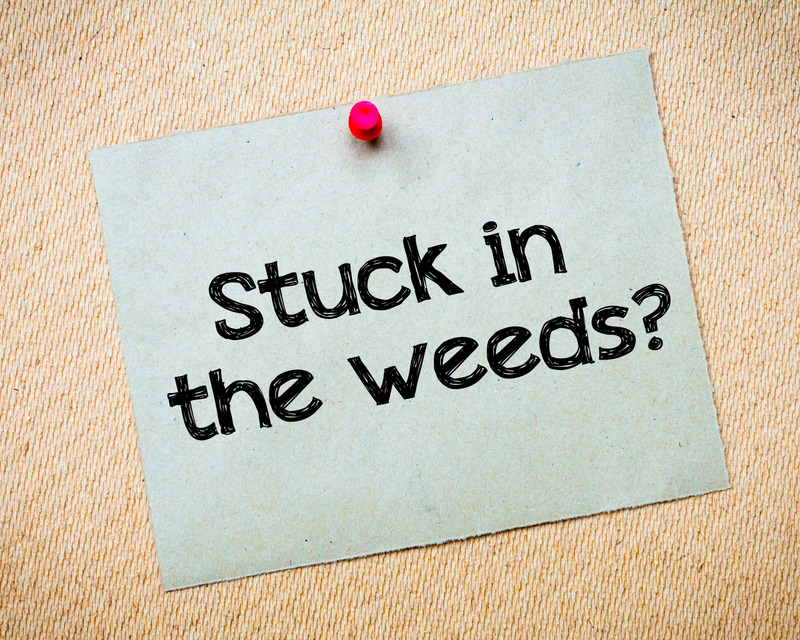If you’re a leader and you’re caught in the weeds of your business, it’s a tough place to be. Being “in the weeds” is an idiom often used in the restaurant industry to describe a server or chef who is hopelessly behind. It also means being concerned with small details, often preventing you from understanding or focusing on what is most important. You no doubt start each day, week, quarter, or year with a plan to achieve your goals, but as the saying goes, no plan survives the attack of the enemy, and the enemies are the weeds.
The enemy of your plans is…
- A key team member who gets sick, her absence bottlenecking the whole week.
- An urgent call from a client who has a major problem with shipment.
- Your executive team not being on the same page, causing you to end up involved in every little issue.
- You needing to track down detailed updates on projects and then triage issues to get a project back on track.
- Miscommunication, requiring you to get involved to fix it.
These are very real weeds that you find yourself immersed in. Sometimes you get in the weeds when you don’t have to, but sometimes the only way it gets fixed is if you do insert yourself. Either way, you’re not focused on what’s most important, and everyone suffers as a result.
Being in the weeds is a drain on you and the business.
When you’re in the weeds of your business, it can’t operate productively or effectively. There’s a personal drain on your energy, time, and focus, which leads to burnout and impacts how you show up for your team. You’re not able to be the leader your people need. It takes you away from focusing on the things that are most important— visionary and strategic thinking.
My client, Brian, illustrated this perfectly in the following email message.
I’m sitting on an airplane after a week in NYC to meet with lawyers about a possible acquisition of another company. While I was there, the FDA made an unannounced site visit back at headquarters and I had to Zoom in for two urgent phone calls. In the meantime, since I don’t currently have a COO running things, I had to try to triage some issues that came up in production for a new product we need to get out to customers by the end of the month. I missed my kid’s soccer game where he started at forward for the first time and I’m hoping that this flight is on time, because my wife and I have reservations for dinner with her parents. I don’t feel like I got anything done this week but was involved in everything. I just want to go to sleep so I order a Heineken from the flight attendant, put my earbuds in and close my eyes.
It’s not easy to get out of the weeds.
When in conversation with clients like Brian, I find they often feel stuck in the weeds. It can be frustrating to operate from this place, and you might feel powerless to do anything about it. I commonly hear my clients say, “But Jeff, I don’t have a choice. That’s just how things go around here.” It’s a real challenge to get out of the weeds, and you might even like the weeds because that’s what you’re comfortable with; however, if you are committed to something even greater, it’s a mandatory step.
So, how do you break the cycle of jumping into the weeds?
3 Questions Every Leader Must Ask Themselves.
In order to escape the “in the weeds” mode, you first have to challenge the notion that you don’t have control, that you don’t have a choice. You do have a choice and in order to change, you first have to accept your part. It might be a little uncomfortable.
To start you through this process, I have three questions to help you think about this.
- First, how have you created this firefighting mode of working? While organizations might have a “in the weeds” or crisis management approach to work, you have willingly decided to simply jump into this river and go with the current. Anytime you respond to a fire – or create one yourself – you’re reinforcing that culture. In addition, we don’t typically do anything unless it serves us in some way or unless there’s a payoff of some sort, which leads me to question number two.
- How does being in the weeds serve you? This could be many things, but one thing my clients often experience is that they experience a rush from the pace that comes with being in firefighting mode. There’s a satisfaction in being someone’s hero for a given situation. The spirit of all of this is noble, but the results put you in a perpetual state of firefighting. This leads us to our third question.
- How committed are you to changing? It’s easy to complain and blame, but the bottom line is, are you ready to change or not? Many people get stuck on the question of, “well, I don’t know how to do it. I don’t know how to change”, but the reality is that you’ve just decided not to change. This is your moment to decide – what are you really committed to instead?
When you get out of the weeds of your business, you’re able to do the important work that you’ve spent your career preparing to do — executing strategy, growing the business, and creating a path for what’s next. When you do this, you operate at your best, and when you operate at your best, your staff and your team are more engaged. Begin by asking yourself these three questions, and reach out to me here if you want help with what to do next.

